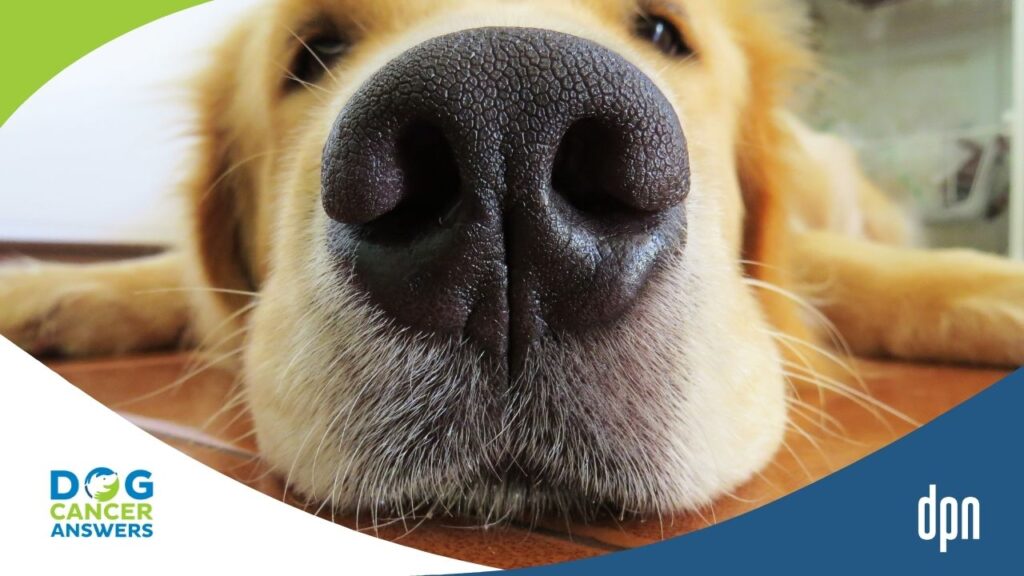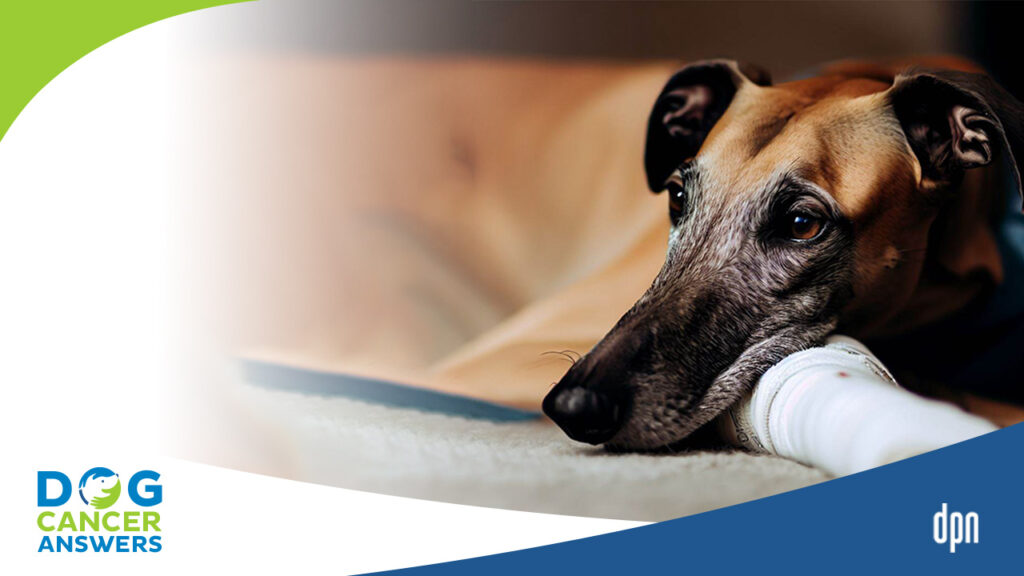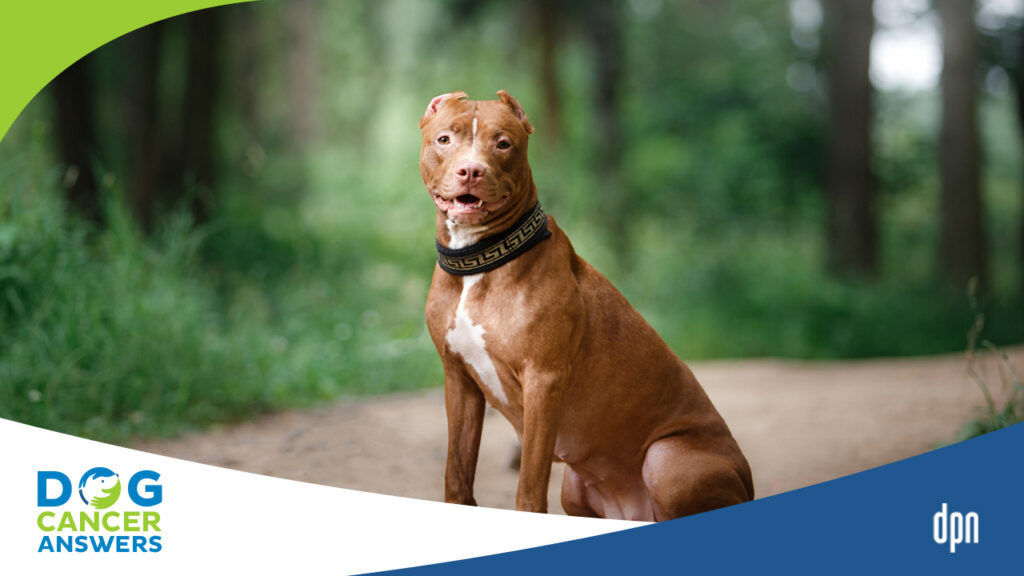[00:00:00] >> Dr. Demian Dressler: Dogs don’t get fat because of Prednisone pills. They get fat because of calories. And so then it becomes a issue of how do we let this dog eat less.
[00:00:10] >> Announcer: Welcome to Dog Cancer Answers, where we help you help your dog with cancer. Here’s your host, James Jacobson.
[00:00:18] >> James Jacobson: Welcome to Dog Cancer Answers. If you have a dog who is taking Prednisone, you may have found yourself wondering how can I keep my dog from eating so much while he’s on Prednisone? My dog wants to eat all the time. What should I do? Well, it’s a common question that we get a lot. Dr. Dressler co-author of The Dog Cancer Survival Guide, along with Dr. Sue Ettinger, talk about in the book and also on today’s episode, because we are taking a listener question about how to handle Prednisone and the munchies that your dog can have while he is on Prednisone. Today, Dr. Dressler takes that question from Dolores in Calgary, Alberta.
[00:01:03] >> Dolores: Hi, my name is Dolores. I’m calling from Calgary, Alberta, Canada. About my 14 year old Sharpei, Yoda. He has been diagnosed with mast cell tumor melanoma for the past two years and is doing quite well on Prednisone at the moment, but my question is how can I manage him being always so hungry without him gaining weight, which isn’t good for him at all.
[00:01:34] I’ve tried numerous things and he’s still always so hungry. It’s hard to, it’s hard to manage. And I was wondering if there was any tips or anything that, uh, we can give him to keep him from being so hungry. He is a Sharpei, so he does have food restrictions. Thank you. And I’d love to hear from you.
[00:01:59] >> James Jacobson: Dr. Dressler.
[00:02:00] >> Dr. Demian Dressler: Yeah. Great question. One of the problems with Prednisone is that it stimulates appetite almost uniformly, particularly if it’s given in high doses. So we’re giving something that does exactly the effect that you’re talking about. And then the question really has to do with, well, I’m doing something, I’m giving my dog a pill that will increase the appetite.
[00:02:18] What can I do so that, that reality doesn’t exist? That reality exists. That’s an effect of the medication. Period. Now, what can you do to sidestep that? Well, let’s see. Maybe we can look at different medications. Okay. Well maybe you could discuss with your vet switching to Methylprednisone. So that’s kind of like Prednisone, except sometimes you can get away with a lower dose.
[00:02:38] It’s a little bit different. It’s Methylprednisone, which is called Medrol, M E D R O L. And that sometimes will give you less appetite and less thirst. That’s one thing to do. The second thing is considered, well do I really need to be using the Prednisone or not? You mentioned two different cancer types at the beginning of the call.
[00:02:55] You mentioned mast cell tumor, and you also mentioned melanoma. And I don’t know if it’s one of those which are two different cancer types, or if it’s both of those. So perhaps we could be looking at some alternative medication other than cortisone type drugs, Prednisone and Methylprednisone to help, for example, many times with mast cell tumors, I will use things that stabilize mast cells, but may not necessarily be Prednisone.
[00:03:19] So there are constituents, for example, like Luteolin, which is found in Apocaps and Quercitin, and Epogen and things like that. And those have some of the beneficial effects that we see with Prednisone. And I’ll use those supplements many times to either eliminate or lower the doses of the cortisone type drugs. And I’ll usually, if I’m using cortisone type drugs, say with Apocaps, I’ll use half the dose of Apocaps, and then we’ll drop the dose of the Prednisone by half. So that can help too. And the third thing is if all else fails and we have to continue these types of drugs and the appetite is still being out of control.
[00:03:54] And by the way dogs don’t get fat because of Prednisone pills, they get fat because of calories. And so then it becomes a issue of how do we let this dog eat less, less with less calories while feeling full. Well you feed them lower calorie foods, and the way to do that, as you do vegetables and you cook up celery stew, and broccoli, and uh, you do some dilute bullion.
[00:04:16] And you put those things together, not with potatoes and corn, but you do the leafy greens and mainly celery, and also some broccoli in there from time to time and cauliflower is okay. And spaghetti squashes okay. And you take away some of the fattening food and you instead give low-calorie seasoned celery stew, and that can help with the feeling of satiety, which is feeling full with less calories going in.
[00:04:41] I hope that helps.
[00:04:42] >> James Jacobson: I think that is helpful. Thanks so much Dolores for your call. Thank you, Dr. Dressler, and you listeners. If you’d like to learn more about Prednisone use in dogs and how that can make your dog hungry and other things that you can do, everything basically, that you need to know about Prednisone, go to the show notes for this episode for links to more information on Prednisone. You can find the show notes at DogCancerAnswers.com/pred, P-R-E-D, or in the show notes that you may be seeing in whatever podcast application you’re looking at right now.
[00:05:24] Those touchstones remind me that you might have a question just like Dolores and we’d love to hear your questions so that we can pose it to one of our veterinarians on a future episode of Dog Cancer Answers. Call our listener line at (808) 868-3200 or visit our website at DogCancerAnswers.com. And while you’re on our website, you can also listen to or download our back catalog. It is the best way to help give you the information that you need to help optimize your dog’s life quality and longevity.
[00:06:02] We’d like to thank our sponsor, The Dog Cancer Survival Guide book by Demian Dressler and Susan Ettinger. The book is available, wherever fine books are sold online and in physical bookstores, if you’d like to help support this podcast, get it right away direct from the publisher, which is Maui Media. You can get the paperback with free shipping anywhere in the USA or the e-book edition for just 9.95. To get either the e-book or the paperback, go to this website, DogCancerBook.com. And because you’re a listener to this show, if you use the promo code PODCAST, when you check out, you can save 10%. The website again, DogCancerBook.com. Use the promo code PODCAST for 10% off at DogCancerBook.com.
[00:06:52] I’d like to thank Dr. Demian Dressler for being our guest today. If you’d like to reach out to him directly, his website is VetInKihei.com. That’s Vet In Kihei, spelled K-I-H-E-I.com. Until next time I’m James Jacobson from all of us here at Dog Cancer Answers. I wish you and your dog, a warm, Aloha.
[00:07:18] >> Announcer: Thank you for listening to Dog Cancer Answers. If you’d like to connect, please visit our website at DogCancerAnswers.com or call our listener line at (808) 868-3200. And here’s a friendly reminder that you probably already know, this podcast is provided for informational and educational purposes only.
[00:07:37] It’s not meant to take the place of the advice you receive from your dog’s veterinarian. Only veterinarians who examine your dog can give you veterinary advice or diagnose your dog’s medical condition. Your reliance on the information you hear on this podcast is solely at your own risk. If your dog has a specific health problem, contact your veterinarian.
[00:07:55] Also, please keep in mind that veterinary information can change rapidly, therefore, some information may be out of date. Dog Cancer Answers is a presentation of Maui Media in association with Dog Podcast Network.





